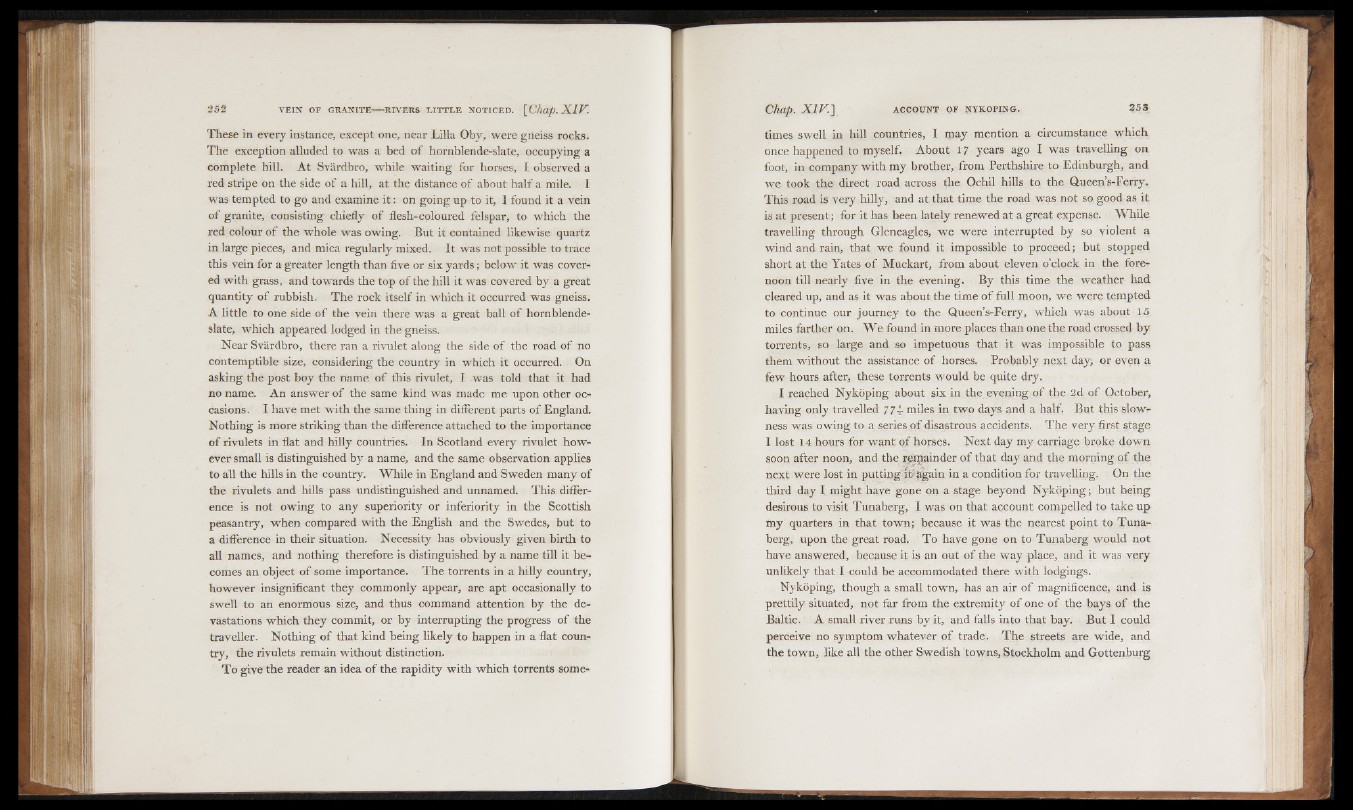
These in every instance, except one, near Lilia Oby, were gneiss rocks.
The exception alluded to was a bed o f hornblende-slate, occupying a
complete hill. A t Sv'ardbro, while waiting for horses, I observed a
red stripe on the side of a hill, at the distance of about half a mile. I
was tempted to go and examine i t : on going up to it, I found it a vein
of granite, consisting chiefly o f flesh-coloured felspar, to which the
red colour o f the whole was owing. But it contained likewise quartz
in large pieces, and mica regularly mixed. It was not possible to trace
this vein for a greater length than five or six yards; below it was covered
with grass, and towards the top of the hill it was covered by a great
quantity of rubbish. The rock itself in which it occurred was gneiss,
A little to one side of the vein there was a great ball of hornblende-
slate, which appeared lodged in the gneiss.
Near Svardbro, there ran a rivulet along the side o f the road o f no
contemptible size, Considering the country in which it occurred. On
asking the post boy the name o f this rivulet, I was told that it had
no name. An answer of the same kind was made me upon other occasions.
I have met with the same thing in different parts of England.
Nothing is more striking than the difference attached to the importance
o f rivulets in flat and hilly countries. In Scotland every rivulet however
small is distinguished by a name, and the same observation applies
to all the hills in the country. While in England and Sweden many of
the rivulets and hills pass undistinguished and unnamed. This difference
is not owing to any superiority or inferiority in the Scottish
peasantry, when compared with the English and the Swedes, but to
a difference in their situation. Necessity has obviously given birth to
all names, and nothing therefore is distinguished by a name till it becomes
an object o f some importance. The torrents in a hilly country,
however insignificant they commonly appear, are apt occasionally to
swell to an enormous size, and thus command attention by the devastations
which they commit, or by interrupting the progress o f the
traveller. Nothing of that kind being likely to happen in a flat country,
the rivulets remain without distinction.
To give the reader an idea o f the rapidity with which torrents sometimes
swell in hill countries, I may mention a circumstance which
once happened to myself. About 17 years ago I was travelling on
foot, in company with my brother, from Perthshire to Edinburgh, and
we took the direct road across the Ochil hills to the Queen’s-Ferry.
This road is very hilly, and at that time the road was not so good as it
is at present; for it has been lately renewed at a great expense. While
travelling through Gleneagles, we were interrupted by so violent a
wind and rain, that we found it impossible to proceed; but stopped
short at the Yates o f Muckart, from about eleven o’clock in the forenoon
till nearly five in the evening. By this time the weather had
cleared up, and as it was about the time of full moon, we were tempted
to continue our journey to the Queen’s-Ferry, which was about 15
miles farther on. W e found in more places tban one the road crossed by
torrents, so large and so impetuous that it was impossible to pass
them without the assistance of horses. Probably next day; or even a
few hours after, these torrents would be quite dry.
I readied Nykoping about six in the evening of fhe 2d of October,
having only travelled 774- miles in two days and a half. But this slowness
was owing to a series of disastrous accidents. The very first stage
I lost 14 hours for want of horses. Next day my carriage broke down
soon after noon, and the remainder o f that day and the morning o f the
next were lost in putting it' $gain in a condition for travelling. On the
third day I might have gone on a stage beyond Nykoping; but being
desirous to visit Tunaberg, I was on that account compelled to take up
my quarters in that town; because it was the nearest point to Tunaberg,
upon fhe great road. To have gone on to Tunaberg would not
have answered, because it is an out o f the way place, and it was very
unlikely that I could be accommodated there with lodgings.
Nykoping, though a small town, has an air o f magnificence; and is
prettily situated, not far from the extremity of one o f the bays o f the
Baltic. A small river runs by it, and falls into that bay. But I could
perceive no symptom whatever o f trade. The streets are wide, and
the town, like all the other Swedish towns, Stockholm and Gottenburg